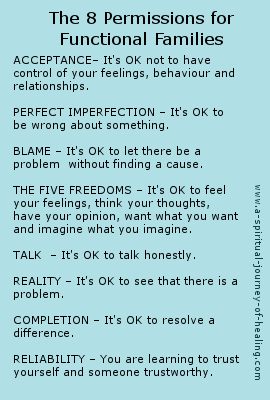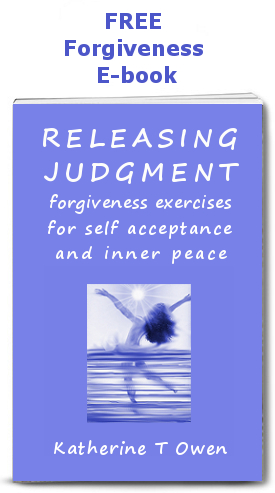Psychology Self Help -
John Bradshaw Book Reviews
Some Favourite Psychology Self Help Books
This article introduces three psychology self help books by John Bradshaw that have been very important to me on my journey to live meaningfully with severe Chronic Fatigue Syndrome/ Myalgic Encephalomyelitis.
The books reviews in this article are for the following books:
- The Family
- Healing the Shame that Binds
- Homecoming - reclaim and champion your inner child
To receive Releasing Judgment, a FREE ebook
or just to keep in touch, sign in below.
Your email will definitely not be misused
and you can unsubscribe at any time.
With love, Katherine
When I got ill, I started reading books on psychology and spirituality and applied various spiritual and psychology self help techniques to my life.
I really needed insights to help me cope at a time when my life seemed to be falling apart. It would be true to say that I studied the psychology books I read.
I thought that the more I could find peace within myself, the more likely I was to heal.
I still think this is true, even though for myself I went onto become severely disabled.
Reading psychology books gave me insights that allowed me to better accept my relationships and better accept myself as a person.
Without psychological understanding I might not have found the strength and peace of mind to choose life and survive.
I am truly grateful to all the authors who helped me.
Bradshaw on The Family – A Revolutionary Approach to
Self Help
Bradshaw on The Family introduces the idea of family systems - the family acts as a
system in such a way that we take on different roles. We can become stuck in various family roles and find it difficult to change.
When we are seeking to learn new patterns of behaviour it can be powerful to look at
- how our family system operated
- the rules we were taught
- the family roles we were expected to play.
The 8 Rules of Dysfunctional Families
Among much insightful information, John Bradshaw includes a list of the 8 of dysfunctional families:
I summarise them below.
The self acceptance exercises (The It's OK to... statements)
are my addition.
By reading these simple self
acceptance exercises you can work on releasing these dysfunctional
family patterns.
A free ebook is available on the link above to explain more about the "It's OK to" exercises.
|
Rule |
Self Acceptance Exercise |
|
Rule 1 of Dysfunctional Families: |
It’s OK to want to control your feelings. |
|
Rule 2 of Dysfunctional Families: |
It’s OK to be right about something. |
|
Rule 3 of Dysfunctional Families: |
It’s OK to blame yourself for something. |
|
Rule 4 of Dysfunctional Families: |
It's OK to suppress a feeling. It’s OK to feel what you feel. |
|
Rule 5 of Dysfunctional Families: |
|
|
Rule 6 of Dysfunctional Families: |
It’s OK to think that everything is OK. |
|
Rule 7 of Dysfunctional Families: |
It’s OK not to take action to resolve this. |
|
Rule 8 of Dysfunctional Families: |
It’s OK not to trust anyone. |
I think for a lot of people these 8 rules of dysfunctional families are just accepted as the way things are!
As someone running a website about spirituality and personal development, rules 3 and 6 are particularly interesting.
Rule number 3: Blame – When things don't go the way you want them to, blame yourself or someone else.
Many times when we think we are taking responsibility for our growth, we are still engaging in a form of blaming ourselves to maintain a sense of control.
I am someone who believes that Nothing is
impossible to God and that God can always work through us.
When I experience something in my life as difficult - and I often have done - I don't have the option of blaming God. Instead I tend to blame myself.
'I am not letting the Love that is through into my life',
'I am not communicating enough love to someone in my life' etc etc!
These things are no doubt true, but if I use them to make myself feel 'not enough'.
I am still engaging in Rule number 3.
My aim is to continue to practice taking a moment to allow things to be the way they
are without trying to find someone to blame!
Rule number 6: Myth-Making – Look on the bright side. Make believe that everything is OK. There isn't a problem.
Spirituality often encourages the practice of gratitude.
Sometimes when we engage in the practice of gratitude, we are
continuing in a practice of myth-making.
It is an important part of the
psycho-spiritual journey to also allow ourselves to see when we are
having a hard time.
I highly recommend the book, Bradshaw on The Family.
If you want to
learn how to free yourself from past patterns of behaviour and how to be
kind to yourself and others, this psychology book has so much to offer.
Click through on the book cover on the right to read more about or buy the book The Family.
Healing The Shame That Binds You by John Bradshaw – a New York Times Bestseller
I came across the idea of family systems roles when reading John Bradshaw books in 1993 – the year I became too ill to work and became pretty much housebound.
I thought that Bradshaw's books listed the dysfunctional family roles that we can take on. But I mis-remembered. I couldn't find the psychological roles listed in his book, so I list them here.
Bradshaw does however refer to the family roles and explain the problems they can cause in his book, Healing The Shame, Chapter 2: The Sources of Toxic Shame.
I recommend John Bradshaw's psychology self help books very highly, for explaining family systems roles and theory and for many other reasons. His books are accessible, yet share with great generosity his knowledge acquired through over 20 years of working as a counsellor.
Bradshaw also draws on the wisdom acquired on his own journey as a recovering alcoholic.
John Bradshaw’s work includes the subject of toxic shame.
He
talks about how we learn to feel ashamed as a child and learn patterns
of behaviour that allow us to manage the shame.
A key to recovery from these patterns of shame is to give ourselves the love we need. You can read about Bradshaw's psychology self help book, Homecoming, below.
Before he was a psychologist, John Bradshaw previously trained as a Catholic priest.
His books are not spiritual, but they include a spiritual perspective. Bradshaw is someone who has questioned his religion and had to heal from some religious teachings. His work is relevant to anyone on the same journey.
Homecoming - Reclaiming and Championing Your Inner Child
Homecoming is the third John Bradshaw book I own and recommend if you are on a journey of psychology self help.
This is quite a different book to the other two, and is an easier book to read.
The books above answer the questions:
Why am I reacting like this?
Why are they reacting like this?
This book answers:
How can I learn to love myself?
How can I let go of bitterness about the past?
How can I parent myself?
John Bradshaw's book Homecoming is the book which introduced me to how to do Inner Child work, including instructions on writing a letter to your self.
Inner child work became an important tool in my journey to love myself.
This is a truly wonderful heart-full book that guides you in a practical way through the steps on how to parent yourself.
As the title implies, you can make a home for yourself by being at home with yourself.
Other Articles on www.a-spiritual-journey-of-healing.com Relevant To Psychology Self Help:
- The Family Systems Roles We May Need To Give Up In A Time Of Illness
- Psychology Self-Help For Myalgic Encephalomyelitis And Other Chronic Illnesses
- 7 Stages of Mourning Loss of Health
- You may also be interested in my list of my favourite spiritual books that have given me inspiration and guidance down the years.
Move from Book Reviews For Psychology Self Help Books to the home page - Practical Spirituality and Healing
Receive daily inspiration...
Receive daily inspiration by putting
your favorite (favourite) quote on
an item you see daily around your home-
a mug, cushion, postcard, coaster, T shirt etc.
You will find my zazzle gift store at
zazzle.com/HealingStore (USA)
Use one of my designs or start from a blank.
zazzle.co.uk/HealingStore (UK)
Thank you so much for supporting this website
www.a-spiritual-journey-of-healing.com
Katherine
My name is Katherine Owen.
Please respect my copyright as the author of this website.
I am delighted if you choose to share on social media, but please do NOT reproduce any of the contents of this page without permission.
© Katherine T Owen









